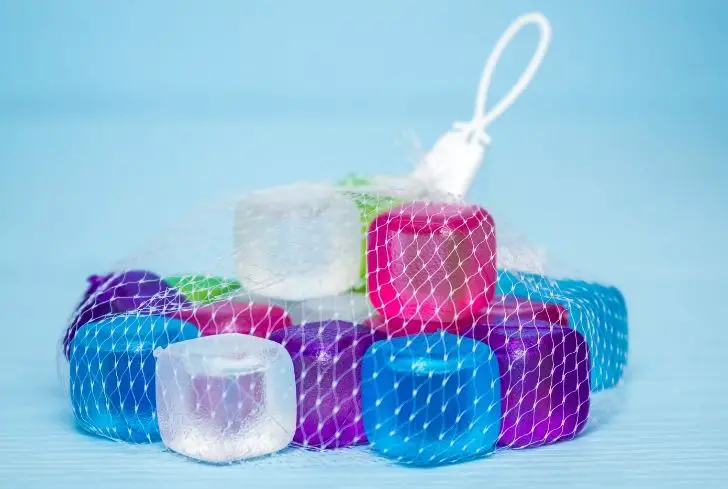So you’ve been using reusable ice cubes because they are healthier, more budget-friendly, and won’t water down your drink like the variety we’ve for many years stocked in our freezers—well done!
However, you just noticed that your dog ate one or several reusable ice cubes, probably thinking that they were a new treat! It’s the first time this happened, and don’t know what to expect. Well, if you are here to find what you should do next, you must be in luck!
First of all, you are not the first one to experience that. There have been several cases of dogs mistaking reusable ice cubes for small tasty treats. And if you have one of the most curious canines, then that’s something bound to happen, especially during the heatwave when we all want ice cubes in almost every drink. So, what should you do if your dog ate reusable ice cubes?
Contents
What Should You Do if Your Dog Ate a Reusable Ice Cube?
After you notice your dog ate a reusable ice cube, the first thing that comes into your mind is what action to take next. After all, you love your furry friend and want to avoid anything that can put their life on the line. And to answer your question— the action to take will depend on the type of reusable ice cube the dog took and the size of your dog.
Type of Reusable Ice Cube
In this world of competition, we enjoy variety in almost everything, including in the things we least expect, reusable ice cubes, for instance. If you have reusable ice cubes, they likely are either plastic or metallic. The market may offer other varieties such as stone ice cubes, but those two are the most common.
If your dog ate ice cubes, it likely belonged to the plastic variety. And by that, I don’t in any way intend to mean that dogs can’t eat the stainless steel cubes. It’s still possible, especially if just from a tasty drink and still have that sweet flavor on them.
True, your pup may not chew stainless steel cubes, but keep in mind metal gets slippery when it comes into contact with saliva or any other liquid and can easily slip down their gut.
Now, stainless steel cubes can either be solid metal or contain gel on the inside. Whether of solid stainless steel or containing gel, your dog’s digestive system is not just strong enough to break down either. That means chances of the internal contents leaking into the dog’s gut are minimal.
But that doesn’t mean you sit back and relax, NO! Contact the vet as soon as possible. While the internal contents may not come into contact with your dog’s stomach, the cube in its entirety can cause intestinal blockage, which is life-threatening.
Again, you have to remember that stainless steel cubes are also a potential choking hazard, so always ensure that you bring in the vet every time your dog ingests them.
On the other hand, where your dog ingests reusable plastic ice cubes, they can still be dangerous. But that will mostly depend on what’s inside them. Unlike metal cubes, plastic variety will crush when chewed. That exposes the dog’s digestive system to the liquid on the inside, which can cause serious issues.
So again, if the ice cubes contain one of the toxic substances (discussed later on in the article), you will need to get in touch with the vet to know the way forward.
The Size of the Dog
Whether the ingested ice cubes will affect your dog also has something to do with their size. Larger dogs have wider guts, meaning what could cause intestinal blockage in the smaller counterparts will more often not lead to anything serious in them.
But that’s not the point here— internal blockage can happen to any dog, is fatal, and you should report any case of ingestion to the vet, whether by a small dog or big pup. However, that was to tell you that intestinal blockage is more likely in smaller canines.
Again, bigger dogs weigh more. The bigger and heavier the dog, the more toxin it takes for any side effects to manifest. Therefore, if you have a smaller dog, it’s best never to ignore when they eat toxic substances, no matter how seemingly tiny the amount.
But are reusable ice cubes toxic to dogs? Well, we will be answering that in a while, but just before we get there, let’s see what exactly goes into these reusable cubes.
What Are Reusable Ice Cubes Made of?
As we stated earlier, some reusable ice cubes are either stainless steel, plastic, or stone. We also said that the latter isn’t as popular as the first two, but it’s the most preferred for Whiskeys and bourbon.
About what they contain, reusable ice cubes don’t all have the same thing. The metallic ones are usually of solid stainless steel. But stainless steel is expensive for most people, and that’s why manufacturers tend to include alternative substances such as gel on the inside of the metallic walls to reduce costs.
For the plastic kind, most of them come with distilled water. They are just like other cubes you probably have used in your home before, only that these have a plastic material to prevent the ice from diluting into your drink when it begins to melt.
But there’s one problem about using distilled water- it doesn’t retain the cold for long, and that tells us why some ice cubes come with non-toxic gel or silica gel. Unlike water, the gel will remain cold for a very long time and is easy to chill.
Can Dogs Die From Eating Reusable Ice Cubes?
Yes, dogs can die from eating reusable ice cubes. However, that isn’t very likely to happen. Stainless steel and reusable plastic ice cubes with silica gel are the most dangerous when ingested by your furry friend.
After consumption, these ice cubes may attract a few digestive issues and other health problems whose side effects range from mild to severe. In other words, ingestion of any of these kinds can be fatal when not addressed with the urgency it deserves.
As a result, it’s best not to wait for side effects to manifest before contacting the vet. Things can happen faster than you probably imagine, so it’s best not to wait until the last minute.
What Happens If Your Dog Ate Reusable Ice Cubes?
Health experts will tell you not to take your drink after silica gel from your reusable ice cubes leak into it. That should give you a hint that silica can be harmful when ingested.
After your dog eats plastic ice cubes with silica gel inside, depending on the size of the dog and the quantity taken, you may notice a few abnormal reactions. That clear, seemingly harmless solution you see inside those small cubes isn’t the most gentle substance on your dog’s tummy. It will likely make your dog sick when ingested in large amounts.
When your lovely Fido eats these cubes in large amounts, they can cause digestive issues such as an upset stomach. You may also notice diarrhea, dehydration (from diarrhea), and other problems of that kind.
Choking and blockage are only likely to happen in the case of reusable stainless steel ice cubes. However, if your dog eats reusable ice cubes containing only distilled water, you may not notice any signs unless the plastic used is toxic.
Are Reusable Ice Cubes Poisonous?
No, reusable ice cubes aren’t poisonous. The silica gel may be toxic, as earlier stated, but the toxicity level is too low and will often not lead to anything serious.
Of course, it can cause a few digestive issues in dogs, but that will only happen when taken in massive amounts, the exact of what you expect from any other thing you offer your dog in plenty—including their regular food.
Distilled water, the other possible content in reusable ice cubes, isn’t known to cause side effects in dogs. But again, it’s not just about what’s inside those cubes—the material keeping that liquid locked in there can also be a potential threat.
Most of the reusable plastic ice cubes use Polyethylene (PE) material, a pet-safe plastic. However, we have a few that contain Bisphenol A (BPA), one of the toxic chemicals for pets.
When ingested, BPA can cause a plethora of health problems. Decreased fertility, obesity, cardiovascular diseases, and impaired fetal development are just a few of the numerous side effects BPA chemicals can cause in your dog.
Can Ice Cubes Make a Dog Throw Up?
While it may look like a straightforward question, it doesn’t come with a short answer. Your four-pawed friend will throw up or fail to subject to the quantity taken relative to the size of the dog.
Small dogs will be irritated by a much smaller intake of reusable ice cubes compared to larger dogs. That means they have the short end of the stick regarding digestive issues and other health problems likely to emanate from eating reusable ice cubes.
However, one thing to keep in mind is that vomiting isn’t as likely to happen as it may seem. Your dog has to eat a much significant number of these ice cubes if at all you have to see it happen.
Conclusion
Reusable ice cubes are a great way of cooling your beverage without watering them down. And while they may cause a few issues in dogs, that’s not very likely to happen.
But again, you don’t want to take even the slightest chances, so always keep them far from where your dog can reach them. In case of ingestion by your dog, it’s best to let the vet know about it to suggest the way forward.







